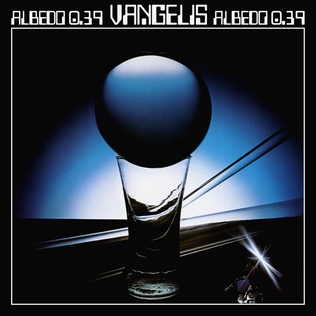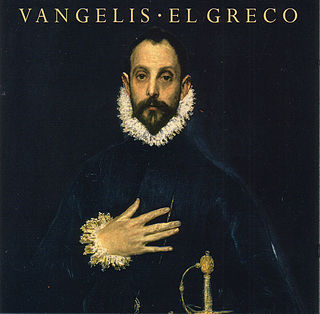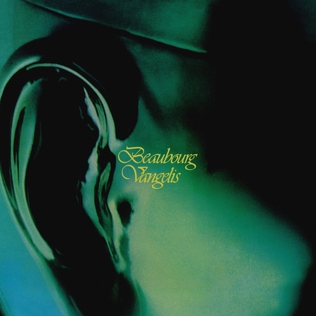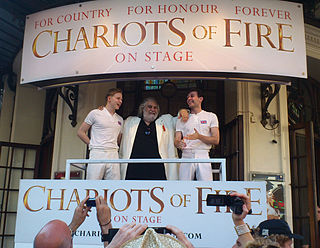
Evangelos Odysseas Papathanassiou, known professionally as Vangelis, was a Greek musician, composer, and producer of electronic, progressive, ambient, and classical orchestral music. He composed the Academy Award-winning score to Chariots of Fire (1981), as well as for the films Blade Runner (1982), Missing (1982), Antarctica (1983), The Bounty (1984), 1492: Conquest of Paradise (1992), and Alexander (2004), and the 1980 PBS documentary series Cosmos: A Personal Voyage by Carl Sagan.

Cosmos: A Personal Voyage is a thirteen-part, 1980–81 television series written by Carl Sagan, Ann Druyan, and Steven Soter, with Sagan as presenter. It was executive-produced by Adrian Malone, produced by David Kennard, Geoffrey Haines-Stiles, and Gregory Andorfer, and directed by the producers, David Oyster, Richard Wells, Tom Weidlinger, and others. It covers a wide range of scientific subjects, including the origin of life and a perspective of our place in the universe. Owing to its bestselling companion book and soundtrack album using the title, Cosmos, the series is widely known by this title, with the subtitle omitted from home video packaging. The subtitle began to be used more frequently in the 2010s to differentiate it from the sequel series that followed.

James Martin Hannett was a British record producer, musician and an original partner/director at Tony Wilson's Factory Records. Hannett produced music by artists including Joy Division, the Durutti Column, A Certain Ratio, Magazine, John Cooper Clarke, New Order, Orchestral Manoeuvres in the Dark and Happy Mondays. His distinctive production style embraced atmospheric sounds and electronics.

Brave is the seventh studio album by Marillion, released in 1994. It charted at number 10 on the UK Albums Chart, being the last of the band's albums to reach the Top 10 in the United Kingdom until F E A R reached number 4 in 2016.

Albedo 0.39 is a studio album by the Greek electronic composer Vangelis, released in 1976. It was the second album produced by Vangelis in Nemo Studios, London, which was his creative base until the late 1980s. It contrasts with his previous album, Heaven and Hell, which was classically inspired and choral, while Albedo 0.39 has blues and jazz overtones. It was his first Top 20 UK album.

Heaven and Hell is a studio album by Greek electronic composer Vangelis, released in November 1975 on RCA Records. It is the first album recorded at his Nemo Studios in London that he used until 1987. It is a concept album based on duality.

Direct is a studio album by the Greek electronic composer Vangelis, released in 1988. The album marks a new development in Vangelis' music, during which Vangelis moved his creative base from London to Athens in Greece, and it was his first album recorded in Athens after relocation from London.

China is a studio album by the Greek electronic composer Vangelis, released in April 1979. Although he had never been to China, he employed Chinese instruments and compositional styles on this concept album. The album received some critical praise. It was certified silver (1985) for sales of over 60,000 copies by BPI.

See You Later is an album by the Greek electronic composer Vangelis, released in November 1980. It breaks quite violently with the style he employed in the late 1970s and later, relying much more on vocals and being more experimental and returning to his early 1970s work like Earth or 666. It was never released in the United States, until it was remastered in 2016 as part of the Delectus boxset.

Heaven and Hell is the ninth studio album by English rock band Black Sabbath, released on 18 April 1980. It is the first Black Sabbath album to feature vocalist Ronnie James Dio, who replaced original vocalist Ozzy Osbourne in 1979.

El Greco is a 1998 classical album by Greek electronic composer and artist Vangelis. The title is a reference to the man who inspired the composition, Dominikos Theotokópoulos, the painter and sculptor of the Spanish Renaissance. It consists of ten long movements performed on electronic instruments.

Earth is the first official solo album by the Greek artist Vangelis, released in 1973. In contrast to Heaven and Hell (1975) and some soundtracks by Vangelis from this period, Earth was not released on compact disc in the 1980s — it was not until 1996 that a CD version was made available, and then only in Greece.

Odes is an album of Greek folk songs by Irene Papas and Vangelis. All of the songs are traditional, except two which are original compositions by Vangelis. Recorded in Nemo studios, London 1979, the entirety of the album is performed and produced by Vangelis, with the addition of a five-people choir in the opening track and of course, Irene Papas' lead vocals. First issue of the album on compact disc was in Greece only . A remastered edition was released by Universal Music in 2007.

Beaubourg is a studio album by the Greek electronic composer Vangelis, released in July 1978. It was the fourth album produced by Vangelis in Nemo Studios, London, and his final album for RCA Records. It is an avant-garde-experimental album.

Blade Runner: Original Motion Picture Soundtrack is the soundtrack for Ridley Scott's 1982 science-fiction noir film Blade Runner, composed by Greek electronic musician Vangelis. It has received acclaim as an influential work in the history of electronic music and one of Vangelis's best works. It was nominated in 1983 for a BAFTA and Golden Globe for best original score. The score evokes the film's bleak futurism with an emotive synthesizer-based sound, drawing on the jazz scores of classic film noir as well as Middle Eastern texture and neo-classical elements.

Olias of Sunhillow is the debut studio album by English singer-songwriter Jon Anderson, released on 9 July 1976 by Atlantic Records. When the progressive rock band Yes took a break in activity in August 1975 for each member to record a solo album, Anderson, having established himself as their frontman, decided upon a concept album that tells the story of four tribes of an alien race and their journey to a new planet after their home is threatened by a volcanic eruption. Olias, a magician, builds a spacecraft named the Moorglade Mover and is helped by fellow magicians Ranyart and Qoquaq to gather and carry the population to their new home.

Alexander is the original film score of the film Alexander (2004), scored by Greek electronic composer Vangelis. It received the Public Choice Award at the 2005 World Soundtrack Academy.
Nemo Studios was a recording studio in London, planned, built and used by Greek composer Vangelis between 1975 and 1987. Numerous highlights of Vangelis' career were composed in Nemo, including soundtracks for Ridley Scott's Blade Runner, and Hugh Hudson's Chariots of Fire.

Vangelis was a Greek musician, composer, and producer. He began his music career in the 1960s with the Greek progressive rock band Aphrodite's Child and in the 1970s began composing electronic music. He gained wide mainstream popularity after composing soundtracks to the films Chariots of Fire (1981) and Blade Runner (1982). His solo career discography consists of 23 studio albums, 26 compilation albums, 12 soundtrack albums, and roughly 29 singles. The majority of his film, documentary, theatre, and ballet & dance scores were not released or officially released. He also collaborated with Jon Anderson and as a duo, Jon and Vangelis, released 4 studio albums, 2 compilations, and 13 singles, and with Irene Papas released two studio albums.
Peter Marsh is an English singer, songwriter, guitarist and music producer. He was a member of the band Easy Street, which released three albums. The Easy Street single "I've Been Lovin' You" entered the Billboard chart in July 1976. In the 1980s, he was best known as the lead singer in cult new wave group Blanket of Secrecy. Marsh also worked with Vangelis, Manfred Mann's Earth Band and Godley & Creme. His songs have been covered by artists including Nick Lowe and Jimmy Ruffin. In the 1990s he recorded the album "Water Under the Bridge", which was eventually released in 2021. More recently, Marsh has worked in France. He released the albums Stop the Clock in 2014 and Back to the Beginning in 2017. A second Blanket of Secrecy album, recorded in the 1980s, was released in 2017.


















